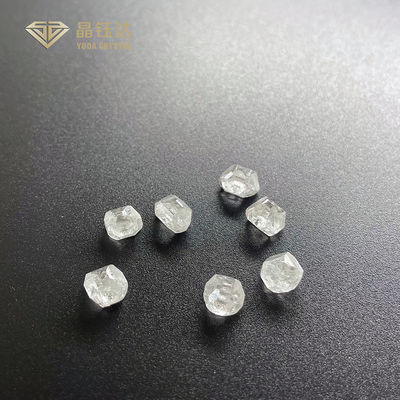DEF Color VVS VS SI Purity 4.0-5.0ct HPHT Rough Diamond For Cutting 2 Ct Hpht Loose Diamonds
Lab Grown Rough Diamonds Description
Synthetic Rough Diamond in laboratory exhibit the same physical, chemical and optical properties as natural diamonds, and exhibit the same flame, flicker and flash. With a jewelry magnifying glass, it is almost impossible to distinguish man-made diamonds from natural diamonds. Laboratory made diamonds may exhibit trace elements different from natural diamonds, which do not affect the appearance of diamonds. Only by using special equipment for testing, can we distinguish between laboratory grown diamonds and natural diamonds. Laboratory produced diamonds available for purchase should always carry gemstone certification to confirm that they are laboratory produced.
Laboratory produced diamonds (also known as laboratory produced diamonds, synthetic diamonds, synthetic diamonds, artificially cultivated diamonds or artificially cultivated diamonds) are synthetic diamonds that reflect natural diamonds. Because they are actually made up of carbon atoms, the diamonds grown in the laboratory show the same chemical and optical properties as natural diamond crystals produced by natural geological processes. The price of synthetic diamonds is generally lower than that of natural diamonds.
Diamonds made in the laboratory are made by copying the manufacturing process of natural diamonds.
Natural diamonds are grown by high temperature and high pressure. After millions of years, carbon atoms are transformed into beautiful and charming gemstones, which we call diamonds.
Diamonds made in the laboratory grow in the same way, only through an artificial process that takes weeks, not millions of years.
Synthetic diamonds start with a small piece of diamond, which is called diamond seed. The seed is sealed in a special chamber designed to simulate conditions inside the crust.
The surface of the seed crystal is coated with pure carbon, which will eventually be transformed into synthetic diamond with the same chemical properties as natural diamond.
There are two different methods for making diamonds in the laboratory; High pressure high temperature (HPHT) and chemical vapor deposition (CVD).
High temperature and high pressure exert intense heat (about 1500 degrees Celsius, or 2700 degrees Fahrenheit) and pressure (1.5 million pounds per square inch) on the diamond seed and the carbon atoms surrounding it. Chemical vapor deposition, on the other hand, uses less heat and pressure, but introduces a mixture of chemical gases, which decomposes and hardens into crystalline carbon atoms.
The results of the two methods are the same; A man-made diamond, made from scratch in a few weeks.
Parameters of Lab Grown Rough Diamonds
| HPHT Lab Grown Diamonds Details |
| Brand Name |
Yuda Crystal |
| Name |
Rough Lab Grown Diamonds |
| Diamond Color |
D-F |
| Diamond Clarity |
VVS-SI |
| Diamond Carat Weight |
4.0-5.0 carat |
| Diamond Cut |
Uncut |
| Technology |
HPHT |
| Size |
5mm-15mm |
| Shape |
Raw |
| Application |
For Cutting Lab Grown Loose Diamonds |
| Place Of Origin |
Zhengzhou, China |
| Delivery Time |
1 - 15 Working Days Base on Order Quantity |
| Payment Terms |
100% Payment In Advance |
| Payment Methods |
T/T, PayPal, Western Union, Bank Transfer |
| Shipping way |
DHL, FedEx, SF Express, UPS, EMS, TNT etc |
| M.O.Q |
Negotiable |
| Diamond Type |
Synthetic(lab created) |
| Location |
Zhengzhou, China |
| Treatments Applied |
None |
| Fire Dispersion |
0.044(Same as Natural Diamond) |
| Brilliance Refraction Index |
2.42(Same as Natural Diamond) |
| Relative Density |
3.52(Same as Natural Diamond) |
| Chemical Composition |
Carbon(Same as Natural Diamond) |
| Moh's Hardness |
10(Same as Natural Diamond) |
Lab Grown Rough Diamonds Introduction
HPHT is the abbreviation for high temperature and high pressure treatment, and its purpose is to change or improve the natural body color of certain types of diamonds to make them more valuable.
In the past, it was called Pegasus diamond and GE POL diamond. The reason why it is called GE Diamond is because The technology developed by GE in the United States is a new product exclusively sold by POL, a subsidiary of Israel's LKI, in 1999.
HPHT technology is to process natural diamonds at high temperature and high pressure to enhance the color grade of diamonds. In one move, it can be upgraded to 4-6 levels. However, not every diamond can be processed by this technology. It must have a J color or higher, and be free of impurities and high-clarity quality. During processing, the results cannot be predicted. In other words, it is not certain what level it can be promoted to.
At the same time, diamonds treated with HPHT may deepen or change in color to become a colored diamond.
Natural diamonds are created by nature and are the result of high temperature and pressure formed over billions of years. The Rough Lab Grown Diamonds are produced in the laboratory, usually in a few weeks. The chemical difference between the two is same.
So how do you distinguish between Rough Lab Grown Diamonds and natural diamonds?
There is no obvious difference between the Rough Lab Grown Diamonds and natural diamonds. Even professional gemologists need special equipment to identify them. By zooming in, professionals will be able to discern subtle contrasts in diamond inclusions grown and mined in the laboratory.
| The Difference Between Lab Diamond And Natural Diamond |
| Properties |
Earth Mined |
Lab Created |
| Guaranteed Conflict-Free |
No |
Yes |
| Hardness (MOHS) |
10 |
10 |
| SP3 Carbon Diamond Bonds (%) |
100% |
100% |
| Internal Crystal Structure |
Face-Centered Cubic |
Face-Centered Cubic |
| Hardness Comparable |
2.42 |
2.42 |
| Relative Diversity |
3.52 |
3.52 |
| Color Diffusion |
0.044 |
0.044 |
| Color |
Various Grades |
K to D grades |
| Price |
$$$$$ |
$$$ |
Lab Grown Rough Diamonds Details


 Your message must be between 20-3,000 characters!
Your message must be between 20-3,000 characters! Please check your E-mail!
Please check your E-mail!  Your message must be between 20-3,000 characters!
Your message must be between 20-3,000 characters! Please check your E-mail!
Please check your E-mail! 






